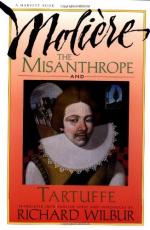|
This section contains 271 words (approx. 1 page at 400 words per page) |

|
The Misanthrope Summary & Study Guide Description
The Misanthrope Summary & Study Guide includes comprehensive information and analysis to help you understand the book. This study guide contains the following sections:
This detailed literature summary also contains Bibliography and a Free Quiz on The Misanthrope by Molière.
The Misanthrope (Le Misanthrope m the original French) is one of the great masterpieces by France's most celebrated comic dramatist. It was first performed at the Palais-Royal Theatre in Paris in 1666, featuring himself in the title role and his own wife in the role of his love-interest.
The Misanthrope is set in the fashionable social milieu of seventeenth-century Paris. Alceste, the misanthrope of the title, is disgusted by the hypocrisy, injustice, and overall corruption in human society. Alceste's concern with the Issue of justice has to do with the fact that he is embroiled m several lawsuits, the outcome of which are determined not by which party is in the right but by who has the most influence in court. Nonetheless, Alceste is in love with Celimene, a young widow with a reputation for flirtation and for surrounding herself with suitors and who is a prime example of the insincerity that Alceste despises in others. In the final act, Celimene is confronted by all of her suitors for her lack of honesty when they discover that she has promised her love to each of them while ridiculing each of the others behind his back. Finally, fed up with society and fearing the consequences of various legal battles, Alceste vows to run off and live in seclusion in the wilderness.
The Misanthrope is concerned with themes of honesty and hypocrisy, justice and injustice, the manipulative social games people play, and the conflict between the individual and society. Critical discussion often focuses on interpretations of the character of Alceste and the question of whether the play professes a clear-cut moral lesson.
Read more from the Study Guide
|
This section contains 271 words (approx. 1 page at 400 words per page) |

|



